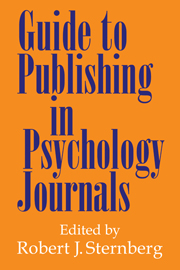Book contents
- Frontmatter
- Contents
- Preface
- PART ONE INTRODUCTION
- PART TWO PARTS OF AN ARTICLE
- 3 Titles and Abstracts: They Only Sound Unimportant
- 4 Introducing Your Research Report: Writing the Introduction
- 5 Theories and Hypotheses
- 6 Writing Effectively about Design
- 7 Doing Data Analyses and Writing Up Their Results: Selected Tricks and Artifices
- 8 Results That Get Results: Telling a Good Story
- 9 What Does It All Mean? The Discussion
- 10 Documenting Your Scholarship: Citations and References
- PART THREE DEALING WITH REFEREES
- PART FOUR CONCLUSION
- Index
5 - Theories and Hypotheses
Published online by Cambridge University Press: 05 February 2012
- Frontmatter
- Contents
- Preface
- PART ONE INTRODUCTION
- PART TWO PARTS OF AN ARTICLE
- 3 Titles and Abstracts: They Only Sound Unimportant
- 4 Introducing Your Research Report: Writing the Introduction
- 5 Theories and Hypotheses
- 6 Writing Effectively about Design
- 7 Doing Data Analyses and Writing Up Their Results: Selected Tricks and Artifices
- 8 Results That Get Results: Telling a Good Story
- 9 What Does It All Mean? The Discussion
- 10 Documenting Your Scholarship: Citations and References
- PART THREE DEALING WITH REFEREES
- PART FOUR CONCLUSION
- Index
Summary
An essay with this title could be written by almost any working social scientist but the form, shape, and content would differ considerably among authors. As a past journal editor and chair of a grants review committee, I have had many opportunities to compose and to systematically read reviews of research. One thing that almost all critics agree on is the importance of theory. Research training for most of us is very clear on how to use statistics to evaluate data; many of us have been exposed to a substantial dose of material on experimental design (e.g., the circumstances under which it is or is not possible to draw causal inferences). Still, in spite of its importance, few of us have had much formal training in “theory.” We pick up much of what we know from our own resonances to the literature in combination with the informal comments of instructors and fellow graduate students and, later, colleagues. There is little in the way of a theory “canon” that all of us study. So, although there is widespread agreement on the importance of theory and hypotheses to research each of us tends to emphasize different aspects in thinking about it. Thus, the issues and the emphases in this treatment are admittedly idiosyncratic.
I think of theories as abstract schemes that help to explain and organize experience. For present purposes, hypotheses are derivations from a more general theory and are often tied to concrete observations.
- Type
- Chapter
- Information
- Guide to Publishing in Psychology Journals , pp. 58 - 80Publisher: Cambridge University PressPrint publication year: 2000
- 6
- Cited by



